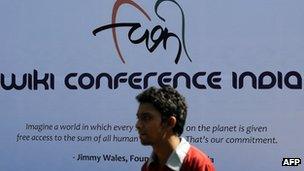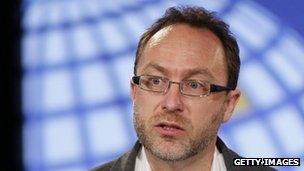Wikipedia hosts India conference amid expansion push
- Published

India already has around 100 million web-users and the number is growing all the time
"Even if I put a full stop on an article, it's visible to the whole world... it's a great feeling."
Twenty-one-year-old Abishek Suryawanshi is a Wikimedian.
For those who haven't read the relevant explanatory page online, that means he's an avid reader, writer and editor of the online encyclopaedia site Wikipedia.
He's also one of some 700 people across India who attended the nation's first-ever Wikipedia conference over the weekend in Mumbai.
"Knowledge is the one platform where each and everyone can come together in this world; it's something which binds us together," says Suryawanshi, a student from Pune who started editing Wikipedia entries 18 months ago.
Plagiarism concerns
The three-day event began with an address by the website's founder, Jimmy Wales, who told those gathered that this "could be largest wiki-conference that's ever been held".
This crowd may be a captive audience, but Mr Wales has big plans to broaden the website's appeal to the rest of India, and tap into the country's growing internet population, which the Internet and Mobile Association of India currently puts at some 100 million.
He wants to encourage more Indians to write Wikipedia entries in their local languages.

Founder Jimmy Wales had to deal with an Indian flag protest
At present there are some 35,844 editors in the English Wikipedia, with only 50 in Hindi.
"Hundreds of millions of people are more comfortable thinking and dreaming and talking and counting in their mother tongue," says Hisham Mundol, who heads up India programmes for the Wikimedia foundation, the charitable arm of the organisation.
"The different kinds of sweets, saris, history, culture - at about every parameter there's so much magic you could write about."
Mr Mundol dreams of a day when every village in India has its own page, providing an original resource on the country.
However, India's internet penetration is still very low as a proportion of the overall population, and it will be a big challenge to reach out beyond the cities and their self-confessed cyber geeks.
One way Mr Mundol says he is trying to do this is through the distribution of "off-line" Wikipedia to schools.
Government schools in Kerala have partnered with his foundation to distribute DVDs containing Wikipedia entries, which children can read on school-issue laptops.
Mr Mundol accepts this will not have the real-time updates and ability to edit, but insists "it's a huge jump from where they are right now in terms of difficulties accessing libraries, or not having the ability to afford books".
The foundation says it is looking to work with governments in Assam and Tamil Nadu on similar initiatives.
In Pune there is a trial programme encouraging students aged 18 to 25 to write their essays as Wikipedia submissions, which are then marked by the college professor.
Nitika Tandon, who works on India education projects for the Wikimedia foundation, admits that one of the biggest problems they have found is plagiarism and that more needs to be done to make students aware of copyright issues.
In India, and the rest of the world, plagiarism has become a by-product of Wikipedia. Many people, like Abishek Suryawanshi, say it is unavoidable and that for some students it is all too easy to look something up on Wikipedia.
But plagiarism has proved to be not the only problem for Wikipedia India.
Outside the Mumbai conference, a group of 10 to 15 protesters demonstrated against the depiction of the map of India on Wikipedia, which they say is an inaccurate and illegal depiction of India's borders.
Mr Wales appeared unconcerned: "It's very important all people become educated on the issues. I want Wikipedia to be neutral on the issues; it's not up to us to decide what's the correct map of India of course, but it is up to us to explain there is this controversy."
- Published3 November 2011
- Published15 January 2011